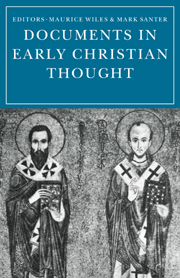6 - TRADITION AND SCRIPTURE
Published online by Cambridge University Press: 17 August 2009
Summary
The extracts so far given have all been concerned with the substance of Christian doctrine. But the proper sources for determining Christian truth and the right use of them was also a matter for debate. The heading ‘Tradition and Scripture’ should not be allowed to suggest that these were thought of as rival sources in the way that has been characteristic of much later Christian history. In debate with the Gnostics of the second century insistence was placed both on the apostolic nature of the accepted writings of the New Testament and on the public nature of the Church tradition handed down from apostolic times. This is the main burden of the first passage of Irenaeus' work against the Gnostics.
Next we have Tertullian arguing for the importance of unwritten tradition in determining the Christian attitude on issues not dealt with in Scripture. But even more fundamental was the problem of how to interpret what was accepted as scriptural. The passage from Origen gives a clear account of the allegorical method of interpretation, which is so characteristic of his own work and of the Alexandrian tradition in general. In the next passage we see that approach applied by Dionysius, bishop of Alexandria shortly after Origen's time, in discussion with people who drew millenarian conclusions from the book of Revelation. The passage also displays an unusually acute literary critical sense in its discussion of the authorship of the writings that make up the Johannine corpus.
- Type
- Chapter
- Information
- Documents in Early Christian Thought , pp. 127 - 158Publisher: Cambridge University PressPrint publication year: 1975



